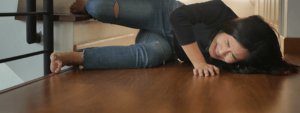In Alabama, property owners have a legal duty to protect guests from injury while they are on their property. When someone is injured, owners can be held legally responsible for those injuries. At the same time, there are a specific set of standards that must be met for the property owners to be held liable. Premises liability law is applicable when the accident occurred somewhere that contains an unsafe condition, the unsafe condition causes an injury or damages, the property owner knew of the unsafe condition (or should have known), and the property owners must have had a reasonable opportunity to repair the unsafe condition. 
The four common types of premises liability cases that we see are
- construction accidents
- slips and falls due to dangerous walkways or pooled liquids
- falling objects
- falls due to unsafe stairs or a lack of (or loose) handrails
In a Bureau of Labor Statistics analysis of construction site injuries from 2019, falls, slips and trips accounted for 32% of non-fatal workplace injuries and 20.7% of total workplace fatalities. This year also marked a 22% increase in fatal slips and falls over the previous year. Construction workers are most at risk for fatal and non-fatal accidents when they fall from a height, like a ladder or elevated surface. In fact, construction workers are seven times more likely to die in a fall than any other industry. Additional workplace injuries include exposure to harmful substances and fires.
It’s worth noting that according to the Centers for Disease Control and Prevention, over one million people suffer from slip and fall injuries each year, with 244,000 of those happening at the workplace. So, while we might think that most of the slip and fall injuries occur in the workplace, the opposite is the case. The majority of these incidents involve people aged 65 and older.
Falling or dropped object injuries happen often in the workplace. The Bureau of Labor Statistics lists several objects that are primary sources of injuries: containers; machinery; parts and materials; persons, plants, animals, rocks, trees, and logs; structures and surfaces; tools; and vehicles. Serious and non-fatal incidents involving falling objects are one of the most common causes of lost work time and lost wages.
Thousands of injuries occur each year due to falls on unsafe stairs and handrail issues. Unsafe stairs are those that are of an improper or uneven height or depth. If the vertical and horizontal measurements of the stairs are defective, then the property owner can be held at fault. This can be proven through the state’s building codes. And since many building codes require handrails for certain types of stairs, the lack of a handrail, or one in poor condition, can make the property owner liable for your injury. Handrails must be of a certain height and width, and installed property so that they are not loose or shaky. Even if the stairs are up to code, an injury from a defective handrail is possible. Our premises liability attorneys can help you if you have been injured due to the negligence or unsafe condition of a property owned by another.
There are two terms worth keeping in mind when thinking about Alabama’s premises liability laws: Invitee and Licensee. An invitee is the person (you) who has been explicitly or implicitly invited onto a property. Invitees are customers and consumers, people who are in a store, restaurant, or doctor’s office. The property owner’s legal duty, or duty of care, to the invitee. This includes regular property inspection, fixing any hazards that may exist, and putting up warnings of possible dangers. If the property owner fails to do so, or if they missed a property issue that they reasonably should have, they may be held responsible for any injuries you befall.
The term licensee is somewhat similar to invitee, in that it is in regard to individuals who enter a property implicitly or explicitly. The difference between the two terms is that the licensee is there for non-commercial purposes, like being a guest for social gatherings, or going onto public lands. The standards for the property owner’s duty of care are lower in these cases than if you were an invitee, with the duty of care that does exist counting only towards hazards they know about.
Attorney Steven A. Harris regularly blogs in the areas of family law, bankruptcy, and real estate closings on this website. He is always available in any of the firm’s offices or by phone anytime for a consultation. Mr. Harris tries to provide informative information to the public in easily digestible formats. Hopefully you enjoyed this article and feel free to supply any feedback. We appreciate our readers and love to hear from you!



